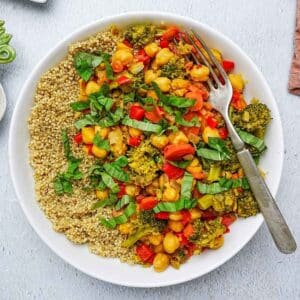
Keep Calm and Curry On
Certain components of curry, such as curcumin (the active compound in turmeric), are known to have strong anti-diabetic properties such as reducing blood sugar levels as well as being anti-inflammatory, cardio-protective, anti-microbial, and more. For this reason, it’s unsurprising that studies show that those who eat more curry have better health as measured by diabetes markers such as A1c, fasting blood glucose, post-prandial blood glucose, and triglycerides.

Curry is a truly global dish, with different areas of the world such as India, Thailand, the Caribbean, and Japan having their own take on it. This is our own simplified version made with low-fat coconut milk to give you the best diabetes outcomes – but you’ll still get to enjoy all the warm, fragrant, satisfying, and of course nutritious parts of the dish that is loved around the world.

Basil
Fresh herbs take any recipe to the next level. They have a potent flavor that gives you positive feedback about the high quality of the food you’re eating.

Basil is especially powerful for people with diabetes. A 2024 review showed that basil leaves are effective in reducing A1c, blood glucose levels, oxidative stress, and insulin resistance, while improving insulin sensitivity and lipid profiles. So load up on this delicious herb!

We Like It Bright
When you look at a meal that has almost every color of the rainbow represented, you know it’s going to be good! This recipe is exactly that, with a variety of vegetable colors, textures, and flavors swimming in the rich coconut curry sauce. You’ll find purple onion, red bell pepper, orange carrots, and green broccoli in a sea of yellow curry – and a colorful feast for the eyes is a feast for the body, too.


Coconut Chickpea Curry
Ingredients
- 1/4 cup (43g) Quinoa, uncooked - Available in 21-oz bags
- 1/2 cups (120g) Water
- 1 cup (150g) Red Onion, finely diced - About 1 large red onion
- 6 (18g) Garlic cloves - About 1/2 of a standard garlic bulb
- 2 tbsp (12g) Ginger, peeled and grated - About a 1-inch piece of fresh ginger
- 2 cups (142g) Broccoli, chopped into small florets - About 1/2 of a medium head of broccoli
- 1 cup (150g) Red Bell Pepper, de-seeded and sliced - About 1 medium red bell pepper
- 1 1/2 cups (183g) Carrot, peeled and sliced - About 3 medium carrots
- 2 1/2 tsp (5g) Curry Powder - Available in spice jars
- 1/2 tsp (1g) Red Pepper Flakes, optional - Available in spice jars
- 1/4 cup (60g) Lite Coconut Milk, canned - Available in 13.5-oz cans
- 2 cups (480g) Vegetable Broth, low sodium - About 1/4 of a standard 32-oz carton
- 1 cup (164g) Chickpeas, cooked, drained, and rinsed - About 2/3 of a standard 15-oz can
- 1/2 cup (12g) Basil Leaves - About 12–15 fresh leaves, loosely packed
Instructions
- Cook the quinoa. You will need twice as much water as quinoa. Add quinoa to a pot with a lid. Add water to the pan, cover, and bring to a boil over medium high heat. Reduce heat to low and simmer for 15-20 minutes or until the water is absorbed and the quinoa is soft. Check on the quinoa periodically, giving it a quick stir, to prevent any sticking or burning on the bottom. When done, remove from the heat, fluff with a fork, and set aside to cool.
- Heat a sauce pan over medium heat. Add the onion, garlic, ginger, broccoli, red pepper, and carrot. Sauté for 5 minutes or until veggies are slightly softened.
- Stir in curry powder, red pepper flakes, coconut milk, vegetable broth and chickpeas. Bring to a boil then reduce to a simmer. Let simmer for 10 minutes. Taste and adjust seasoning as needed.
- Serve over quinoa and garnish with basil. Enjoy!
Notes
- Quinoa: If you have your quinoa pre-cooked, multiply the uncooked quantity by 3 to get the cooked amount for your dish. Quinoa triples in size when cooked.

